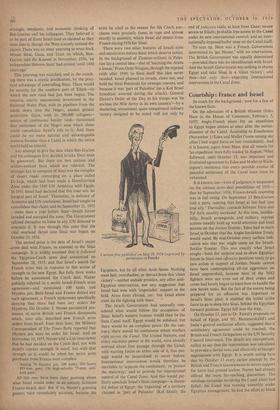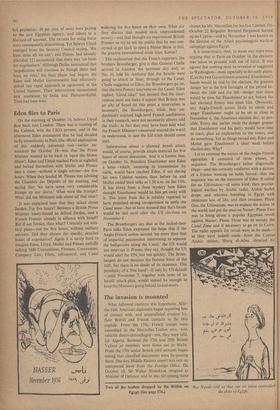Courtship : France and Israel
So much for the background : now for a few of the known facts.
On the admission of a British Minister (John Hare in the House of Commons, February 5, 1957) Anglo-French plans for an expedition to Egypt began almost at once after the nation- alisation of the Canal. According to Eisenhower (November 1) Eden and Mollet ('some among our allies') had urged force on him immediately. And it is known, again from Hare, that all vessels for `an expedition' were fully loaded 'in August.' What followed, until October 13, was impatient and frustrated agreement by Eden and Mollet to Wash- ington's insistence that every possible avenue of peaceful settlement of the Canal issue must be exhausted.
It is known, too—even if judgment is suspended on the curious arms deal possibilities of 1955— that by September, 1956, Franco-Israeli courtship was in full swing. On September 23 Ben-Gurion told a party meeting that Israel at last had 'one true ally.' Thereafter, contacts between Paris and Tel Aviv steadily increased. At this time, inciden- tally, Israeli propaganda and military reprisal actions steadily built up world attention and local tension on the Jordan frontier; Eden had to warn Israel, in October that the Anglo-Jordanian Treaty would stand. By mid-October every surface indi- cation was that war might come on the Israeli- Jordan frontier. This was exactly what Israel sought—both for surprise and to draw Egyptian forces in Sinai into offensive positions ready to go into action in support of Jordan. Nasser cannot have been contemplating all-out aggression on Israel unprovoked, because most of the MiG fighters were not even out of their crates and crews had barely begun to learn how to handle the new Soviet tanks. But the fact of the enemy being prepared for an offensive was important in Israel's Sinai plan; it enabled the initial strike force to go in deep into Sinai, behind the Egyptian forward position. Egypt fell into the trap.
On October 13, just as Dr. Fawzi's proposals on behalf of Egypt, and Mr. Hammarskjold's and India's general mediation efforts, suggested that a satisfactory agreement could be reached, the British and French Delegations to the UN Security Council intervened. The details are unimportant, suffice to say that.the intervention was calculated to provoke a Soviet veto, and effectively to hamper negotiations with Egypt. It is worth noting here that by October 13 every earlier attempt by the British and French Governments to secure support for force had proved useless. Nasser had already offered the most far-reaching guarantees. The sabotage campaign involving the Canal pilots had failed; the Canal was running smoothly under Egyptian management. So had the effort to block toll payments : 40 per cent. of users were paying to the new Egyptian agency, and others to a blocked-off account. The excuses for using force were consequently diminishing. Yet Selwyn Lloyd emerged from the Security Council saying, 'We have done all we can'; and Pineau had already (October 11) announced that there was 'no basis for negotiations.' Although Dulles announced that 'negotiations will continue as though there had been no veto,' the final phase had begun; the Eden and Mollet Governments had effectively spiked any rapid approach to agreement at the United Nations. Their intervention necessitated new mediation by India and Hammarskjold. Time had been won.











































 Previous page
Previous page